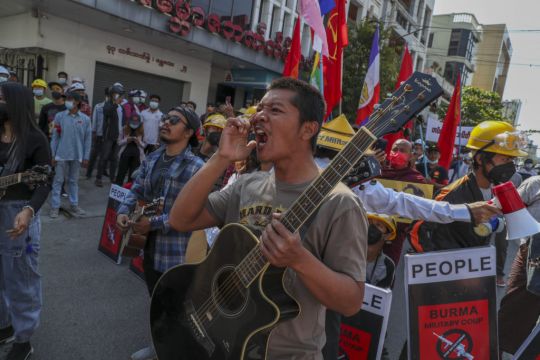Regional diplomatic efforts to resolve Myanmar’s political crisis gathered pace on Wednesday as protests continued in Yangon and other cities calling for the country’s military to stand down and Aung San Suu Kyi’s elected government to be returned to power.
Indonesian foreign minister Retno Marsudi visited the Thai capital of Bangkok as part of her efforts to co-ordinate a regional response to the crisis triggered by Myanmar’s military coup on February 1.
Also making the trip to neighbouring Thailand was the foreign minister appointed by Myanmar’s new military government, retired army colonel Wunna Maung Lwin, said a Thai government official.
Another Thai official said Mr Lwin met with Thai foreign minister Don Pramudwinai as well as Thai prime minister Prayuth Chan-ocha, himself a former army chief who first took power in a military coup.
There was no immediate word whether Ms Marsudi also met the Myanmar diplomat.

Indonesia and fellow members of the Association of Southeast Asian Nations are seeking to promote some concessions by Myanmar’s military that could ease tensions before there is more violence.
The regional grouping, to which Thailand and Myanmar also belong, believes dialogue with the generals is a more effective method of achieving concessions than more confrontational methods, such as sanctions, often advocated by western nations.
Opposition to the coup within Myanmar continued on Wednesday, with a tense stand-off taking place in the country’s second-biggest city Mandalay, where police holding riot shields and cradling rifles blocked the path of about 3,000 teachers and students.
After about two hours, during which demonstrators played protest songs and listened to speeches condemning the coup, the crowd moved away.
On Saturday, police and soldiers shot dead two people in Mandalay as they broke up a strike by dock workers. Earlier in the same week they had violently dispersed a rally in front of a state bank branch, with batons and slingshots.

Also on Wednesday, about 150 people from a Christian group gathered in Yangon, Myanmar’s largest city, to call for restoration of democracy and the release of Ms Suu Kyi and other civilian leaders held since the coup.
International pressure against the takeover also continues, with more than 130 civil society groups issuing an open letter to United Nations Security Council calling for a global arms embargo on Myanmar.
The letter released on Wednesday cited concerns about Myanmar’s citizens being deprived of a democratically elected government and ongoing violations of human rights by the military.
“Any sale or transfer of military-related equipment to Myanmar could provide the means to further repress the people of Myanmar in violation of international humanitarian and human rights law,” the letter said.
In addition to a sweeping arms embargo, the letter said any Security Council measures should make sure there is “robust monitoring and enforcement mechanisms”.







